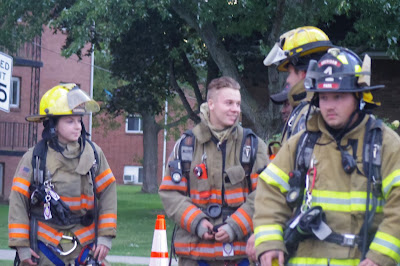 |
| Charles Jones of the Grand Island Fire Company discusses fire safety |
The correct way to operate a fire extinguisher involves the word "PASS."
Pull out the pin safely.
Aim the nozzle at the bass of the fire.
Squeeze the nozzle.
Sweep the fire, making sure to get it all.
And there's more. I learned quite a bit about fire safety when I went to visit Huth Road Elementary School yesterday to take pictures for the PTA. Charles Jones of the Grand Island Fire Company spent the week visiting local schools. Yesterday, I saw him at Huth Road Elementary School during his presentation for fourth and fifth graders. Today, I saw him again at the Grand Island Fire Company's annual open house.
So... where do fires start? When I was a kid, I was terrified of fire. I truly didn't understand that fires actually had a cause. I believed that all fires were the result of spontaneous combustion. In my mind, a fire could start anywhere at any time. It wasn't a very reassuring thought.
The idea that fires actually have causes and, therefore, can be prevented is much more reassuring. One of the most common places for a fire to start is in a kitchen. Kitchens are actually fairly hazardous places because of the presence of oils, chemicals, and electricity.
Other places that fires start readily are in industrial buildings. The chemicals are extremely volatile and everything burned, despite the presence of fire safety doors and sprinklers.
How should you keep safe?
 |
| This is a simulation of a living room. It was set on fire as a demonstration of fire fighting techniques during the Grand Island Fire Company Open House. |
 |
| firefighters dressed in their gear. Most firefighters in the United States are members of volunteer units. |
 |
| the fire has been started and smoke is beginning to form. First the smoke is white, but, later, it turns black. Today, the winds caused the smoke to blow mostly to the north. |
Don't play with matches or fire.
Be careful with electricity.
Be safe in the kitchen.
 |
| It's a conflagration! |
If you see smoke, get low to the floor and crawl. Before opening doors, touch doors to make sure that they don't feel too hot. Don't hide. Fires are frightening and, usually, we like to hide from danger, but hiding in a burning building is a very dangerous idea. Scared or not, you get out of the burning building. Don't go back inside for any reason whatsoever! Once you're out, stay out
 |
| Success |
 |
| The fire is out. It still needs to be inspected and investigated. Although there are no more flames, this room is still considered to be a fire hazard. |
"We are your friends," Charles Jones said, explaining that firefighters may sound ferocious. "We have to yell so you can hear us."
Remember! Always have a planned escape route and two ways out of every room!



7 comments:
I'm sorry to say that we Indians are not very good at fire safety. Having worked for a British firm, I've seen close hand how seriously they take this. We all need reminders to make sure we do the safe thing!
That live demo looks scary. Although we have fire extinguishers all over our housing complex I've never really thought of needing to use one. Next time I step out I will give them a closer look. This is actually quite important. No point having them all-around if none of us knows how to work them.
What an appropriate time to read about fire prevention when so much of my state is burning. I haven't thought of escape routes from my rooms in ages. I'm not even sure my husband could climb out a window. At least we have only one story. I also need to get a fire extinguisher here. I tend to think of fires as more of an outside danger than an inside danger, but I know I need to be prepared. Thanks for writing such an informative post.
Though we have a fire extinguisher here, I don’t know how to use it. This post was very informative and we need fire safety awareness. Thank you for sharing this, Alice.
It's very important to not just have fire safety devices in place at our homes and workplaces as well as public places but to also train people in using them properly! Sadly, although there is awareness about health and safety issues, not much is done to ensure that these are always accessible to people in need, especially in the country where I live. A lot remains to be done!!
What a great detailed and informative blog about a very important topic. I love the photos to go along with the descriptions, it adds so much more to it. Thanks for the great reminder for all.
as part of the ERT team at my work, I used to attend these trainings provided by the local fire department, and I recall the PASS acronym from that. It has been a while since I attended and your post was definitely a great refresher course!!
Post a Comment